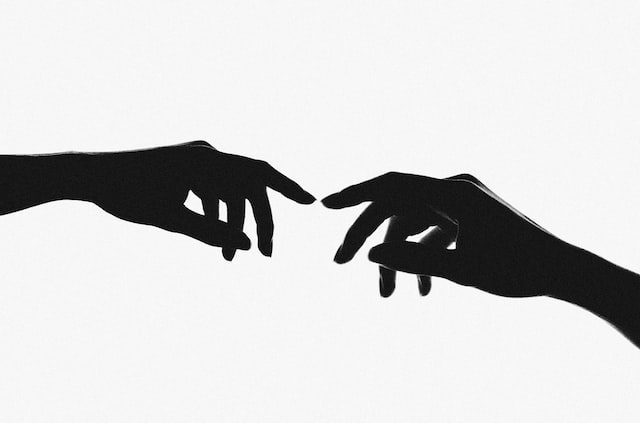
Touch
Whenever my daughter comes over with my grandson for a visit, my grandson greets me with his hands first. He puts them up in excitement, waves them around, and then touches my face—my cheeks, my eyes, my mouth. Then, he leans forward, and I lean towards his nose and I breathe him in. His little baby scent makes me high. Then I lift him out of his car seat and embrace him and he wraps his short, little arms around my neck and pulls my hair. He plunges his drooly mouth over my mouth and smooches me up. It’s the best way to be told “Hello, I have missed you, I love you” and it’s all done without words. I greet him with my Minnesotan-wanna-be British accent—you just cannot say “Hello, Oliver!” without an accent, it doesn’t feel right.
Babies learn about the world through touch. Touch means many things to an infant. It means nourishment—breast or bottle feeding touches the mouth and cheeks and soothes her when she is hungry. It means care, security, attention. The mouth especially is how they discover the world. Is it pleasing to my mouth? If it is, then it shall be pleasing absolutely. But also, the fingertips teach a baby how to understand the world. What does it feel like on their skin? Is it an icky sensation? Does it hurt, tingle, is it rough, squishy, wet, dry, soft, silky, etc.? Touch communicates the world to a child and we encourage them to touch and feel things all the time to expand their understanding.
Until we don’t. Once we generate an entire world solely dependent on touch, we take it away from them. As they age, we discuss “good touch/bad touch”, boundaries, proper etiquette with strangers. We gradually tell them that touch is bad except for very narrow circumstances. Once allowed to hug and kiss anyone and everything that came into view, children must then learn to reject touch, fear touch, avoid touch, and restrain the desire to want to touch.
There isn’t anything wrong with teaching our children boundaries and we should inform our children about the possibilities of others who would manipulate touch in a way that is harmful to children. With that being said, we should also remember that all their knowledge was founded on touch, so teaching them to suddenly stop utilizing this action as a means to understand and connect to others could be problematic. While we don’t want our children to continue to put everything in their mouths as a means of sensing to understand things, we certainly don’t want them to be afraid of touch to the point that they suffer from it.
How can we use touch to understand and connect to others?
Numerous studies have been released that demonstrates the impact that COVID-19 has had on individuals who live alone or are unpartnered. The science shows that lack of touch has a negative effect on people. But this isn’t a new science, so to speak.
Professor of Neuroscience for Johns Hopkins School of Medicine, Dr. David Linden says that “Touch is social glue. It’s what binds sexual partners into lasting couples…Bonds of trust are formed by touch.” However, given that billions of people have had to socially distance, quarantine, and altogether avoid or reduce any and all intimate and social gatherings, it’s easy to understand why there is a looming abundance of distrustfulness around the world. I believe this “touch deprivation” as Dr. Linden calls it, is spreading all throughout the world.
Dr. Linden says “To be human is to be emotional, to feel things. For all of us, the sense of touch is intrinsically emotional.” Linden then makes reference to what it means to be emotionally clumsy—tactless, which translated literally means “lacking touch.” The word “tactile” means “of, relating to, or being the sense of touch.” The word “tact” defines a responsive sensitivity to difficult or challenging issues. To be considered as someone who lacks tact is to be deemed emotionless and insensitive. It’s offered, typically, as a strike against someone.
So, what do we say about a grand collective that has been isolated (or has had to significantly reduce physical proximity and contact to others), untouched, and unable to form bonds of trust by way of touch? Would we say this collective is tactless? Would we then understand why there seems to be a lack of trust, connection, compassion, and understanding in the world right now?
The touch experience is an emotional experience, and more than that, it’s a spiritual experience. Without touch, our emotions become hardened. I don’t have to look much further than my social media newsfeeds than to see how truly accurate that is. Our emotions are hardened to the point that when we engage with people, we reject anything close to intimacy and instead, offer a full display of tactlessness—exuberant insensitivity that ultimately leads to disconnection.
As David Krae once wrote, “Sometimes, a soft touch can accomplish more than a thousand words.” Does this resonate with you? A soft touch can say “I’m sorry” in a way that words can never articulate. A soft touch can extend grace and forgiveness that internally heals and energizes us. A soft touch can end an argument with a lover, heal the broken heart of a teen, and reduce the pain of a scrape on a child’s knee.
A society excluded from the safety of touch, one that developed out of a no-touch policy, is on a path toward destruction. As The Atlantic reported, those orphans from the famous Romanian Orphanage study are now adults, and their overall mental and physical health is suffering significantly. A tactless society is a sick society, riddled with disease, and plagued by depression, anxiety, and isolation.
What if we decided to make tactfulness great again? What if we considered that the reactions we are subjected to, and the reactions we may dole out, are merely side-effects of a touch deprivation? How would we remedy that?
Diana Ross said it best: “Reach out and touch (somebody’s hand) and make this world a better place if you can.” It’s really that simple. Touch is healing. It’s relaxing. It’s stress-relieving. The health benefits to touch are too numerous to list. Simply reach out and touch someone. And if you don’t have anyone to touch, touching yourself, caressing yourself, embracing yourself will suffice.















